Planning for development in the 60 years of ILPES
2015 to the present day: Planning for sustainable development
Planning has emerged as a key instrument and discipline for development management in Latin America and the Caribbean, and as an essential means for formulating and implementing inclusive national sustainable development strategies that converge with the 2030 Agenda for Sustainable Development. Approved in the framework of the United Nations General Assembly in September 2015, the 2030 Agenda establishes a collectively agreed upon roadmap to achieve a balanced and integrated sustainable development in its three dimensions --economic, social, and environmental--. From this frame of reference, the objective of planning is to contribute to how development is cultivated and advanced. Development in this sense emerges from the collective ideal of what humanity aims for and envisions for the future, as well as the visions of its diverse organized groups.
Since 2015, ILPES has focused its work on the role of planning in development governance and the management challenges posed by increasingly complex and dynamic planning systems. Within the following framework of planning and management challenges, ILPES continues to provide support to country governments in the region through research, technical cooperation, capacity building and peer-to-peer exchange and learning:
-
The inter-temporal dilemma arising from multiple planning horizons --long, medium, and short run-- and the mechanisms that reconcile them.
-
The problem of multi-scale coordination concerning the definition of different territorial development planning scales (local, sub-national, national, and global) and their integration.
-
The difficulty of reconciling sector-based and integral-based planning perspectives, while still maximizing their individual contributions.
-
The challenge of integrating multiple and diverse social actors and agents in planning processes.
-
The need to articulate planning and implementation processes and to mainstream learning through evaluation and monitoring systems and as a mechanism for dialogue and feedback.
The territory in its various scales (global, regional, national, and subnational) continues to accompany the Institute's actions as a key element for generating new consensus and policies, as it exposes the diversity of contexts and actors involved in development, and the variety of strategies required to adequately respond to the specificity of development situations and problems.
Featured publications
-
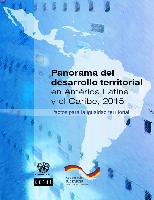 Panorama del desarrollo territorial en América Latina y el Caribe, 2015: pactos para la igualdad territorial
by
Call Number: LC/W.671Publication Date: 2015
Panorama del desarrollo territorial en América Latina y el Caribe, 2015: pactos para la igualdad territorial
by
Call Number: LC/W.671Publication Date: 2015 -
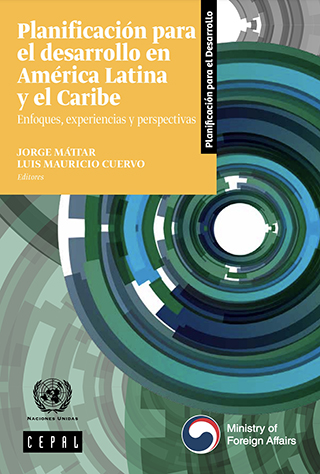 Planificación para el desarrollo en América Latina y el Caribe: enfoques, experiencias y perspectivas
by
Call Number: LC/PUB.2017/16-PPublication Date: 2017
Planificación para el desarrollo en América Latina y el Caribe: enfoques, experiencias y perspectivas
by
Call Number: LC/PUB.2017/16-PPublication Date: 2017 -
 Panorama del desarrollo territorial en América Latina y el Caribe, 2017: agendas globales de desarrollo y planificación multinivel
by
Call Number: LC/TS.2017/120Publication Date: 2017
Panorama del desarrollo territorial en América Latina y el Caribe, 2017: agendas globales de desarrollo y planificación multinivel
by
Call Number: LC/TS.2017/120Publication Date: 2017 -
 Desde el gobierno abierto al Estado abierto en América Latina y el Caribe
by
Call Number: LC/PUB.2017/9-PPublication Date: 2017
Desde el gobierno abierto al Estado abierto en América Latina y el Caribe
by
Call Number: LC/PUB.2017/9-PPublication Date: 2017 -
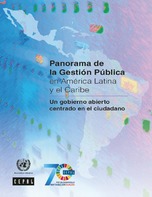 Panorama de la gestión pública en América Latina y el Caribe: un gobierno abierto centrado en el ciudadano
by
Call Number: LC/TS.2017/98Publication Date: 2018
Panorama de la gestión pública en América Latina y el Caribe: un gobierno abierto centrado en el ciudadano
by
Call Number: LC/TS.2017/98Publication Date: 2018 -
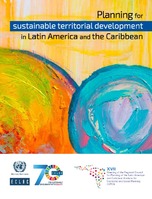 Planning for sustainable territorial development in Latin America and the Caribbean
by
Call Number: LC/CRP.17/3Publication Date: 2019
Planning for sustainable territorial development in Latin America and the Caribbean
by
Call Number: LC/CRP.17/3Publication Date: 2019 -
Estado abierto y gestión pública: el papel del sector académico by
Call Number: LC/PUB.2023/24-PPublication Date: 2024 -
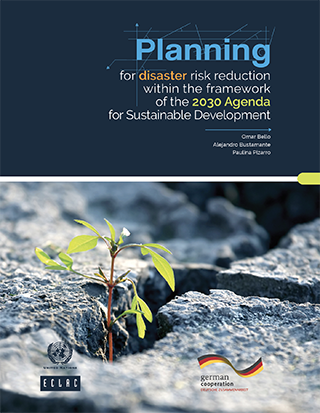 Planning for disaster risk reduction within the framework of the 2030 Agenda for Sustainable Development
by
Call Number: LC/TS.2020/108Publication Date: 2020
Planning for disaster risk reduction within the framework of the 2030 Agenda for Sustainable Development
by
Call Number: LC/TS.2020/108Publication Date: 2020
-
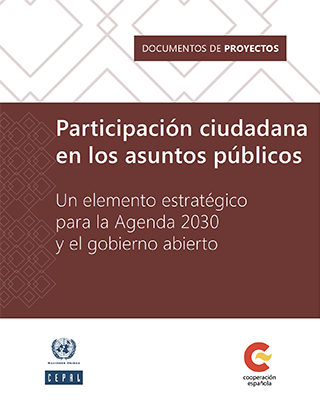 Participación ciudadana en los asuntos públicos: un elemento estratégico para la Agenda 2030 y el gobierno abierto
by
Call Number: LC/TS.2020/184Publication Date: 2021
Participación ciudadana en los asuntos públicos: un elemento estratégico para la Agenda 2030 y el gobierno abierto
by
Call Number: LC/TS.2020/184Publication Date: 2021 -
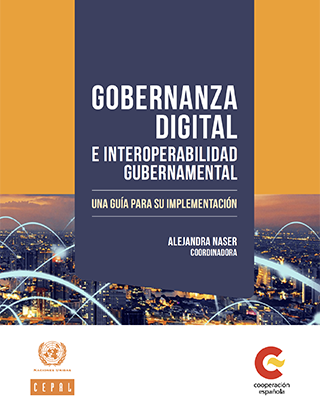 Gobernanza digital e interoperabilidad gubernamental: una guía para su implementación
by
Call Number: LC/TS.2021/80Publication Date: 2021
Gobernanza digital e interoperabilidad gubernamental: una guía para su implementación
by
Call Number: LC/TS.2021/80Publication Date: 2021 -
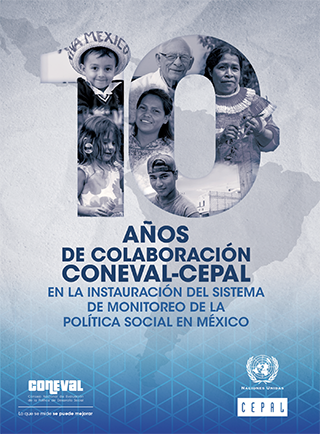 10 años de colaboración CONEVAL-CEPAL en la instauración del Sistema de Monitoreo de la Política Social en México
by
Call Number: LC/TS.2021/132Publication Date: 2021
10 años de colaboración CONEVAL-CEPAL en la instauración del Sistema de Monitoreo de la Política Social en México
by
Call Number: LC/TS.2021/132Publication Date: 2021 -
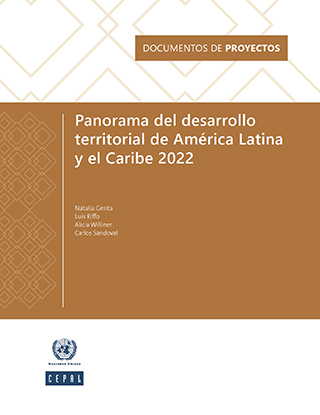 Panorama del desarrollo territorial de América Latina y el Caribe 2022
by
Call Number: LC/TS.2022/132Publication Date: 2022
Panorama del desarrollo territorial de América Latina y el Caribe 2022
by
Call Number: LC/TS.2022/132Publication Date: 2022 -
 Políticas públicas integrales. El caso de las políticas de desarrollo territorial
by
Call Number: LC/TS.2023/90Publication Date: 2023
Políticas públicas integrales. El caso de las políticas de desarrollo territorial
by
Call Number: LC/TS.2023/90Publication Date: 2023 -
 Guía para el diseño de estrategias de resiliencia territorial frente a desastres socionaturales
by
Call Number: LC/TS.2023/91Publication Date: 2023
Guía para el diseño de estrategias de resiliencia territorial frente a desastres socionaturales
by
Call Number: LC/TS.2023/91Publication Date: 2023 -
Prospectiva para el desarrollo: aportes para una gobernanza territorial con mirada de futuro by
Call Number: LC/CRP.19/3Publication Date: 2023-11-06 -
Panorama de la Gestión Pública en América Latina y el Caribe, 2023: un Estado preparado para la acción climática by
Call Number: LC/PUB.2023/27-PPublication Date: 2024-03-24
A selection of seminars (2015 to present)
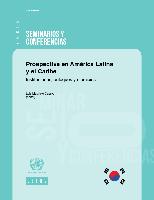
Prospectiva en América Latina y el Caribe. Instituciones, enfoques y ejercicios / L.M. Cuervo (2014)
II Conference on Planning for Development - Seminar, Latin America and the Caribbean to 2030: World visions, continental perspectives, Santiago, 24-25 September 2014.
Serie Seminarios y Conferencias 86 (LC/L.4194)

Prospectiva en América Latina: aprendizajes a partir de la práctica / L.M. Cuervo y F. Guerrero (eds.) (2018)
III Conference on Planning for Development - International Seminar, The Sustainable Development Goals and the construction of futures for Latin America and the Caribbean, Santiago, 18-19 May 2016.
Serie Seminarios y Conferencias 88 (LC/TS.2018/38)
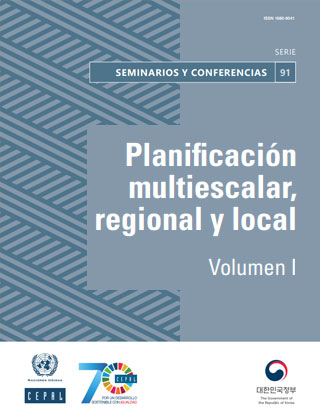
Planificación multiescalar, regional y local. Volumen I / L.M. Cuervo y M.del P. Délano (eds.) (2019)
Reunión de Expertos en Planificación Multiescalar y Desarrollo Territorial, Santiago, 15 a 17 noviembre 2017.
Serie Seminarios y Conferencias, N° 91 (LC/TS.2019/53)
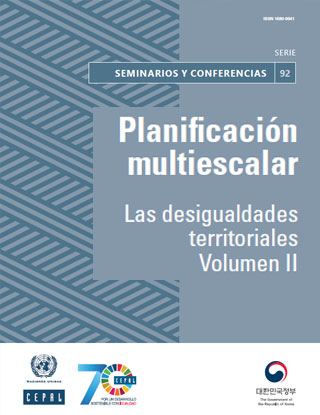
Planificación multiescalar: las desigualdades territoriales. Volumen II / L. M. Cuervo y M. del P. Délano (eds.) (2019)
Reunión de Expertos en Planificación Multiescalar y Desarrollo Territorial, Santiago, 15 a 17 noviembre 2017.
Serie Seminarios y Conferencias, Nº 92 (LC/TS.2019/54)
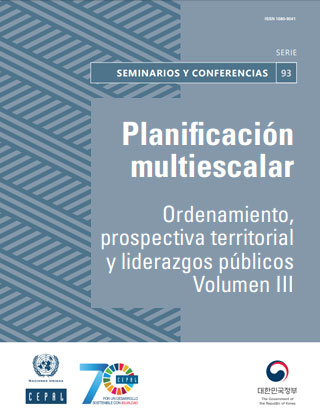
Planificación multiescalar: ordenamiento, prospectiva territorial y liderazgos públicos. Volumen III / L.M. Cuervo y M. del P. Délano (eds.) (2019)
Expert Meeting on Multi-Scale Planning and Territorial Development, Santiago, 15-17 November 2017.
Serie Seminarios y Conferencias N° 93 (LC/TS.2019/61)

Los desafíos de la planificación para el desarrollo en América Latina y el Caribe: algoritmos, metodologías y experiencias / L. M. Cuervo y M. Délano (eds.) (2022)
V Conference on Planning for Development – International Seminar, 70 years of ECLAC: Planning for development with a vision for the future, Santiago, 22-23 October 2018.
Serie Seminarios y Conferencias, N° 95 (LC/TS.2022/11)
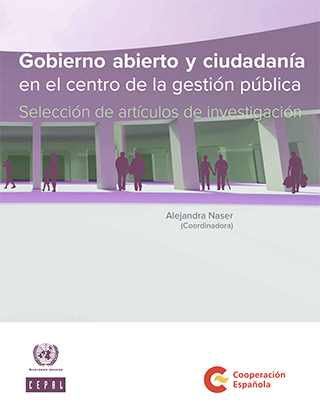
Gobierno abierto y ciudadanía en el centro de la gestión pública: selección de artículos de investigación / A.Naser (coord.) (2021)
VI Planning Conference – Open Government and citizenship at the centre of public management, Santiago 1 April 2020 (event cancelled due to COVID 19).
Documentos de Proyecto (LC/TS.2021/114)
